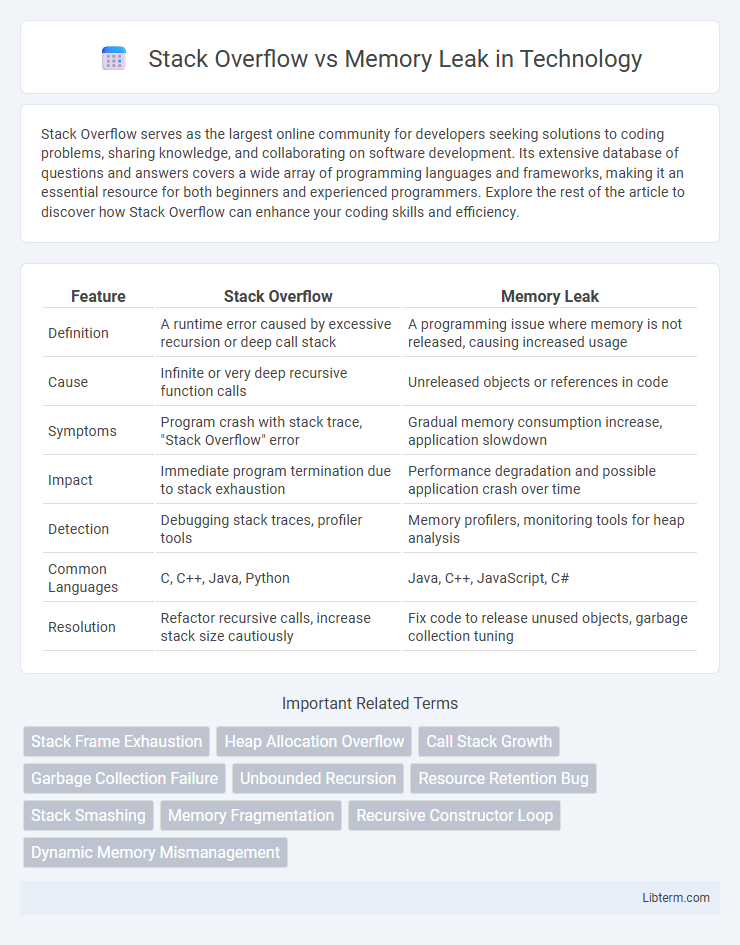Stack Overflow serves as the largest online community for developers seeking solutions to coding problems, sharing knowledge, and collaborating on software development. Its extensive database of questions and answers covers a wide array of programming languages and frameworks, making it an essential resource for both beginners and experienced programmers. Explore the rest of the article to discover how Stack Overflow can enhance your coding skills and efficiency.
Table of Comparison
| Feature | Stack Overflow | Memory Leak |
|---|---|---|
| Definition | A runtime error caused by excessive recursion or deep call stack | A programming issue where memory is not released, causing increased usage |
| Cause | Infinite or very deep recursive function calls | Unreleased objects or references in code |
| Symptoms | Program crash with stack trace, "Stack Overflow" error | Gradual memory consumption increase, application slowdown |
| Impact | Immediate program termination due to stack exhaustion | Performance degradation and possible application crash over time |
| Detection | Debugging stack traces, profiler tools | Memory profilers, monitoring tools for heap analysis |
| Common Languages | C, C++, Java, Python | Java, C++, JavaScript, C# |
| Resolution | Refactor recursive calls, increase stack size cautiously | Fix code to release unused objects, garbage collection tuning |
Introduction to Stack Overflow and Memory Leak
Stack Overflow occurs when a program exhausts the call stack memory, typically caused by infinite recursion or excessive function calls, leading to a program crash. Memory Leak refers to the unintended retention of memory in an application due to failure in releasing unused objects, causing increased memory consumption over time. Both issues significantly impact software performance and stability, requiring effective debugging and memory management techniques.
Key Differences Between Stack Overflow and Memory Leak
Stack Overflow occurs when the program exhausts the call stack, often due to excessive or infinite recursion, leading to a runtime error. Memory Leak involves the gradual loss of available memory caused by improper memory management, such as not freeing allocated objects, resulting in degraded system performance over time. Key differences include that stack overflow affects the call stack size and is typically immediate, while memory leaks pertain to heap memory consumption and manifest gradually.
Causes of Stack Overflow in Programming
Stack Overflow errors in programming primarily result from infinite or excessively deep recursion, where a function repeatedly calls itself without a proper base case, exhausting the call stack memory. Allocating large local variables or arrays on the stack can also trigger stack overflow exceptions by exceeding the limited stack size. Improper use of function calls, such as unbounded loops combined with recursion or failing to release stack frames, commonly leads to stack overflow crashes in software applications.
Common Sources of Memory Leak
Common sources of memory leaks in programming often stem from improper management of dynamically allocated memory, such as failing to release resources after use and maintaining unnecessary references that prevent garbage collection. Stack overflow issues typically arise from excessive or uncontrolled recursion, which rapidly consumes stack memory, whereas memory leaks gradually deplete heap memory without being reclaimed. Identifying patterns like circular references, unreleased listeners, and persistent cache entries is essential to prevent memory leaks and ensure efficient application performance.
Symptoms and Detection of Stack Overflow
Stack Overflow symptoms include rapid program crashes, unexpected behavior, or error messages like "stack overflow detected," often caused by excessive function calls or deep recursion. Detection methods involve monitoring stack usage through debugging tools, runtime error logs, and analyzing memory consumption patterns to identify abnormal stack growth. Effective detection also relies on profiling call stack depth and inspecting stack tracebacks during program execution.
Identifying Memory Leak in Applications
Identifying memory leaks in applications requires monitoring memory usage patterns and analyzing heap dumps to detect objects that are no longer needed but not released. Tools like profilers and diagnostic utilities can track retained memory and pinpoint leaks by showing increasing memory consumption over time or failure to free resources despite garbage collection. Understanding the difference between a stack overflow, caused by excessive call stack usage, and a memory leak, involving improper memory management, is crucial for accurate debugging and application stability.
Impact of Stack Overflow on Program Stability
Stack Overflow occurs when the call stack pointer exceeds the stack boundary, causing critical memory corruption that leads to program crashes and unpredictable behavior. The impact on program stability includes abrupt termination, loss of data, and increased difficulty in debugging due to corrupted stack frames. Preventing stack overflow through proper recursion limits and stack size management is essential to maintain application reliability and prevent system failures.
Consequences of Memory Leak over Time
Memory leaks gradually consume available system memory, causing applications to slow down, crash, or behave unpredictably as resources become exhausted. Unlike stack overflow errors, which manifest abruptly and halt program execution, memory leaks degrade performance silently over time, leading to increased latency and instability. Prolonged memory leaks can result in system-wide issues, requiring restarts or memory management interventions to restore normal operations.
Best Practices for Preventing Stack Overflow
Preventing stack overflow involves carefully managing function call depth and optimizing recursive algorithms by implementing base cases and limiting recursion depth. Utilizing iterative solutions or tail call optimization reduces excessive stack usage, while monitoring memory consumption through profiling tools helps identify potential overflow risks. Adhering to these best practices ensures stable application performance and minimization of stack overflow errors in software development.
Strategies to Avoid and Fix Memory Leaks
Effective strategies to avoid memory leaks include using automated memory management tools such as garbage collectors and employing static code analysis to detect potential leaks early. Developers should prioritize freeing unused memory explicitly in languages like C and monitoring heap allocation patterns to identify abnormal memory growth. Employing memory profiling tools and integrating regular code reviews targeting resource release practices significantly reduce the risk of memory leaks and improve application stability.
Stack Overflow Infographic

 libterm.com
libterm.com